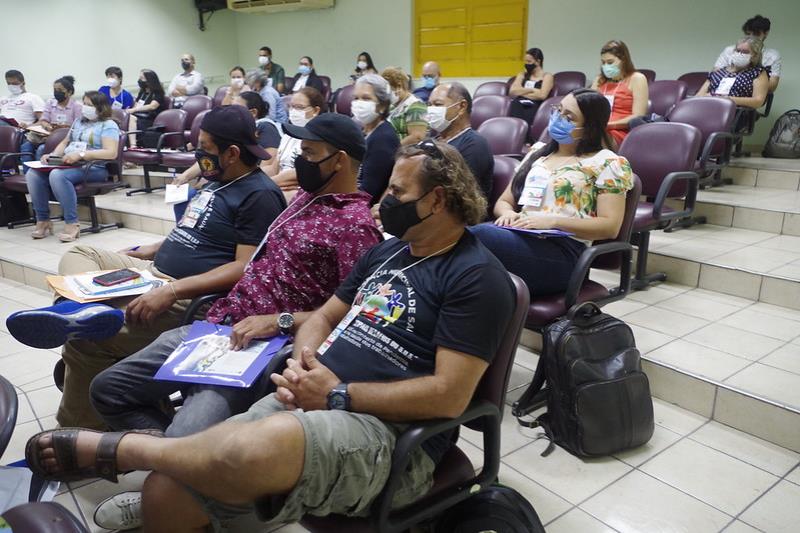Representatives from various health-related sectors in the states of Pará, Amazonas and Amapá participated in the first day of the regional meeting of Project Integra – Integration of National Policies on Health Surveillance, Pharmaceutical Assistance and Health Science and Technology on Tuesday (19)), from 8 am to 5 pm, In the auditorium of the Institute of Health Sciences, Federal University of Pará (UFPA), in Belém.
This is the second phase of the project, which is being promoted by the National Council of Health (CNS), the Oswaldo Cruz Foundation (Fiocruz) and the National School of Pharmacists (ENF), with the support of the Pan American Health Organization (PAHO). From ENFar and the Organizing Committee of the Integra project, Silvana Leite, opened the meeting by explaining all the phases of the project, its importance, its objectives and how to organize the second phase, which expects seven face-to-face meetings in several Brazilian cities, preparatory to the 9th National Symposium on Science, Technology and Pharmaceutical Assistance, on 15-16 September, at Vuecruz headquarters, in Rio de Janeiro.
According to her, the stage of confrontation reaches an audience that, for some reason, did not have access to online activities, which were implemented in the first stage of the project, in 2021. And creative ability. Let’s take advantage of the fact that these people are here and determine how they have experienced the epidemic and the critical problems that must be faced in the Unified Health System (SUS),” he said.
The meeting was welcomed by project representatives, the National and Municipal Health Boards and Professor Maria Fanny Dolabella, from the UFPA Pharmacy Course. CNS representative, Conceição Silva, said she was happy to participate in the first face-to-face meeting which underscores “the need to strengthen not only the SUS, but also health councils and public policies aimed at health”.
Marcos Corre, representative of the Health Council of Amazonas, noted the critical moments that the Amazonas experienced with the collapse of the health system at the height of the Covid-19 epidemic, in 2021, with a lack of oxygen in hospitals and for the sake of it. To survive being sick is in danger. “I’m talking about the field of prevention and the field of determining that the epidemic has come to confuse medicine.”
dynamics
In the afternoon, the participants were divided into groups for the collective construction of the intervention proposal to strengthen the National Policy on Science, Technology and Innovation in Health, the National Policy on Pharmaceutical Assistance and the National Policy on Health Surveillance, which will be presented at the conclusion of the meeting on Wednesday morning (20). Reading a text about a pharmacist’s experience during a pandemic was the starting point for the meeting dynamics, with the aim of eliciting reflection among the pharmacists, students, health agents and municipal councilors present.
According to Celia Chavez, of the National Union of Pharmacists and the Executive Coordination of Project Integra, it is a very important methodology of social control so that participants can be more active and, at the end of the meeting, propose actions to combat the causes of problems at the local and national level. “The idea is to provoke discussion and identify public health problems during a pandemic, and describe what you think is important to address and identify the causes of these problems,” she said.
After Belem, the direct meetings of the Integra project will be held in the cities of Belo Horizonte (MG), on May 5-6; Fortaleza (CE), May 19-20; Rio Branco (AC), June 2 and 3; Goiânia (GO), 23 and 24 June; São Luis (MA), July 7 and 8 and Florianópolis (SC), July 14 and 15.
About the project
The Integra project was proposed in 2021, in the context of the Covid-19 pandemic, the Integra project arises from the need to mobilize the population to meet the critical health, social and political conditions of this period and in the near future. The goal is to promote policy and practice integration strategies in health surveillance, pharmaceutical assistance, and health science, technology and innovation within the scope of participatory management and social movements. The idea is to create and strengthen an intersectoral and integrated network of leaders who are able to work collaboratively to advocate for science development, public policy, national sovereignty, and social control over health.
The first phase was implemented in 2021, with a 40-hour online training on the E-Farma platform, lasting eight weeks and with teacher support, for more than 700 people from all Brazilian states. The aim was to build local intervention projects, after diagnosing and identifying problems, with a focus on strengthening local policies.
Tags
Science and Technology Health UFPA

“Wannabe internet buff. Future teen idol. Hardcore zombie guru. Gamer. Avid creator. Entrepreneur. Bacon ninja.”

